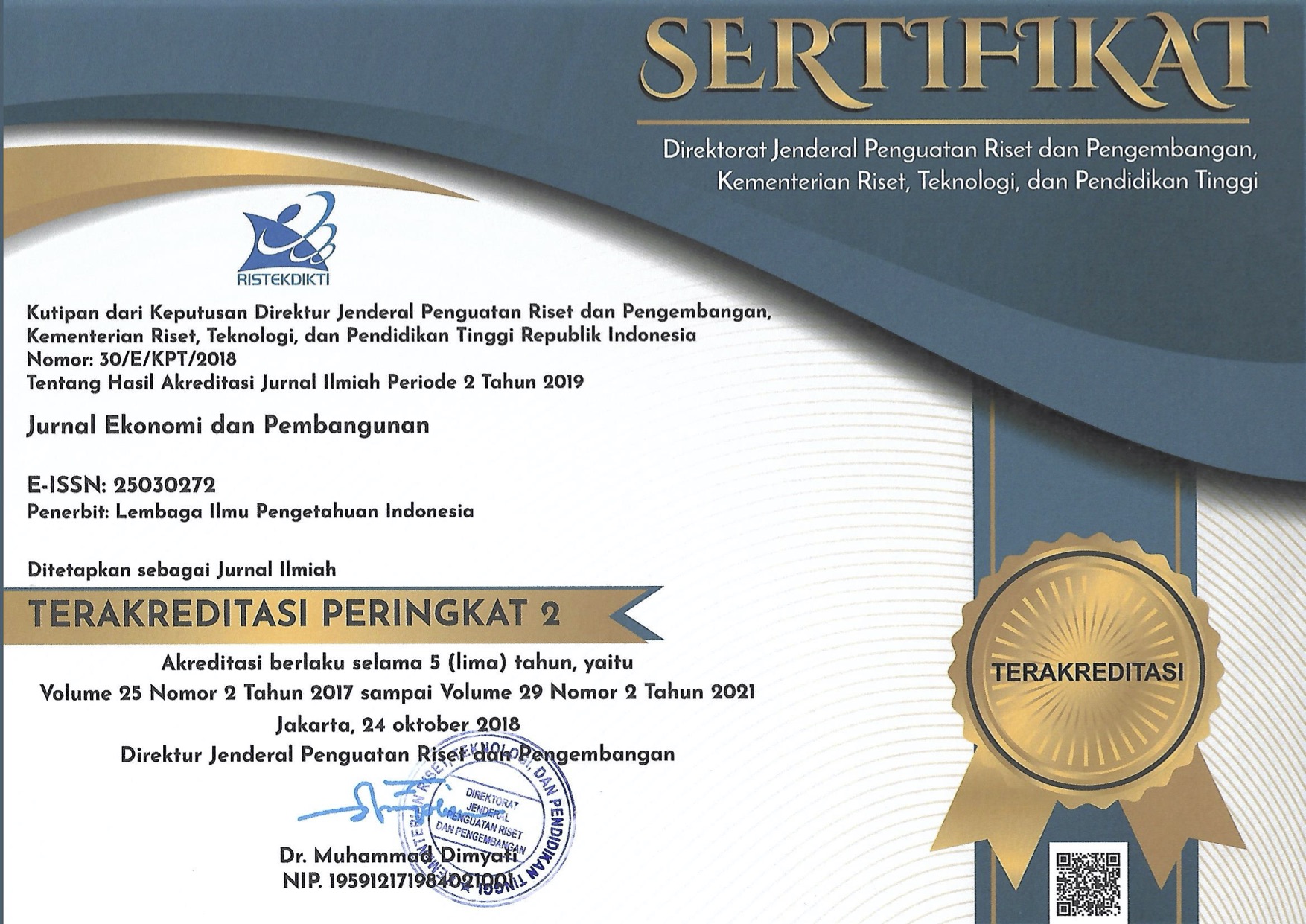Ketahanan UMKM di Indonesia menghadapi Resesi Ekonomi
Abstract
Wabah COVID-19 telah membuat ekonomi Indonesia masuk episode resesi, yang ditunjukkan oleh pertumbuhan ekonomi (y-o-y) negatif selama 2 kuartal berturut-turut, yaitu Q2-2020 sebesar -5.32% dan Q3-2020 sebesar -3.49%. Penelitian ini menjelaskan bahwa usaha mikro, kecil dan menengah (UMKM) di Indonesia memiliki daya tahan yang cukup kuat dalam menghadapi resesi ekonomi. Penelitian ini mewawancarai 541 UMKM dari seluruh Indonesia selama Agustus-Oktober 2020 melalui telepon dan video call. Penelitian ini juga melakukan focus group discussion (FGD) dari beberapa responden yang disurvei. Berdasarkan analisa deskriptif ditemukan bahwa 19% UMKM sudah tidak dapat bertahan, 30% UMKM masih mempertahankan karyawannya, dan 51% lainnya masih dapat bertahan. Bantuan dari pemerintah baru dirasakan oleh UMKM yang memiliki kredit dari bank. Berdasarkan pengujian t-statistik, terjadi penurunan pada seluruh indikator kinerja UMKM akibat COVID-19. Penurunan signifikan terjadi pada modal kerja (-54%), tenaga kerja (-37 %), pendapatan bulanan (-34%), tanah (-2%), dan mesin dan peralatan (-3%). Sementara itu, penurunan beban oerasional bulanan (-21%) secara statistik tidak signifikan. Kegiatan FGD menyimpulkan bahwa UMKM yang bertahan adalah yang memiliki cadangan kekayaan (hidden wealth) berupa tabungan, atau asset bangunan dan kendaraan yang dapat dijual atau digadaikan. Disaster risk management (DRM) dan penyusunan business continuity plan (BCP) merupakan hal terpenting bagi UMKM sehingga dapat bertahan dalam kondisi kritis saat bencana terjadi. Pemerintah harus mulai membantu UMKM dalam penyusunan hal tersebut. Social bonds dapat menjadi instrumen alternatif bagi pemerintah, untuk mengatasi persoalan ini.
Downloads
References
https://www.bps.go.id/website/materi_ind/materiBrsInd-20200805114633.pdf. (n.d.).
https://www.kemenkeu.go.id/covid19. (2020).
https://www.kemenkeu.go.id/publikasi/berita/ini-sederet-cara-pemerintah-selamatkan-umkm-agar-bertahan-dari-dampak-covid-19/. (n.d.).
https://www.thebalance.com/what-is-a-recession-3306019#what-is-a-recession. (n.d.).
Illowsky, B., & Dean, S. (2020). Statistics. OpenStax.
Mardanugraha, E. (2016). Disaster-Resilience of Small and Medium Enterprises (SMEs) in Indonesia: Survey Result and Policy Environment. Asian Business Forum. The Asian Disaster Preparedness Center (ADPC).
OECD. (2020). Coronavirus (COVID-19): SME Policy Updated 15 July 2020 .
Peeters, S., Schmitt, M., & Volk, A. (2020, Aug). Social Bonds Can Help Mitigate The Economic and Social Effects of the COVID-19 Crisis. Emerging Market Compass.
Picard, M. (2017). Enabling Environment & Opportunities Indonesia Strengthening Disaster And Climate Resilience Of Small & Medium Enterprises In Asia. https://www.researchgate.net/publication/320554517.
Shinozaki, S. (2020). Dampak COVID-19 terhadap Usaha Mikro,Kecil dan Menengah di Indonesia:Hasil Survey Cepat. Manila, Jakarta: Asian Development Bank .
Statistik, B. P. (2020). Analisis Hasil Survei Dampak Covid-19 Terhadap Pelaku Usaha. Jakarta: BPS RI.
Copyright (c) 2022 Author(s)

This work is licensed under a Creative Commons Attribution-NonCommercial-ShareAlike 4.0 International License.
Terms and Conditions of Publication
1. Author's Rights and Authorities
As an author, you (or your employer or institution) may do the following:
-
make copies (print or electronic) of the article for your own personal use (not for commercial purpose), including for your own classroom teaching use;
-
make copies and distribute such copies (including through email) of the article to research colleagues, but not allowed to distribute commercially and systematically, e.g. via an email list or list server;
-
present the article at a meeting or conference and to distribute copies of the article to the delegates attending such meeting;
-
retain all proprietary rights in any process, procedure, or article of manufacture described in the work;
-
include the article in full or in part in a thesis or dissertation;
-
use the article or any part thereof in a printed compilation of your works, such as collected writings or lecture notes, and other derivative works, with full acknowledgement to JEP as the original journal publishing the article;
-
may reproduce material extracted from the article or derivative works for the author's personal use, but must consider the copyrights procedure.
All copies, print or electronic, or other use of the paper or article must include the appropriate bibliographic citation for the article’s publication in the journal.
2. Requests from Third Parties
Although authors are permitted to re-use all or portions of the article in other works, this does not include granting third-party requests for reprinting, republishing, or other types of re-use. Requests for all uses not included above, including the authorization of third parties to reproduce or otherwise use all or part of the article (including figures and tables), should be referred to P2E-LIPI by going to our website at http://ekonomi.lipi.go.id/.
3. P2E LIPI Copyright Ownership
Economic Research Center, the Indonesian Institute of Sciences (P2E-LIPI) owns the copyrights to reproduce, distribute, disseminate, translate, and other uses in accordance with the existing Laws and Regulations.
Every accepted manuscript should be accompanied by "Copyright Transfer Agreement" prior to the article publication.

This work is licensed under a Creative Commons Attribution-NonCommercial 4.0 International License.
JEP Journal by P2E-LIPI is licensed under a Creative Commons Attribution-NonCommercial-ShareAlike 4.0 International License. Permissions beyond the scope of this license may be available at http://jurnalekonomi.lipi.go.id/index.php/JEP
If you are a nonprofit or charitable organization, your use of an NC-licensed work could still run afoul of the NC restriction, and if you are a for-profit entity, your use of an NC-licensed work does not necessarily mean you have violated the term.





